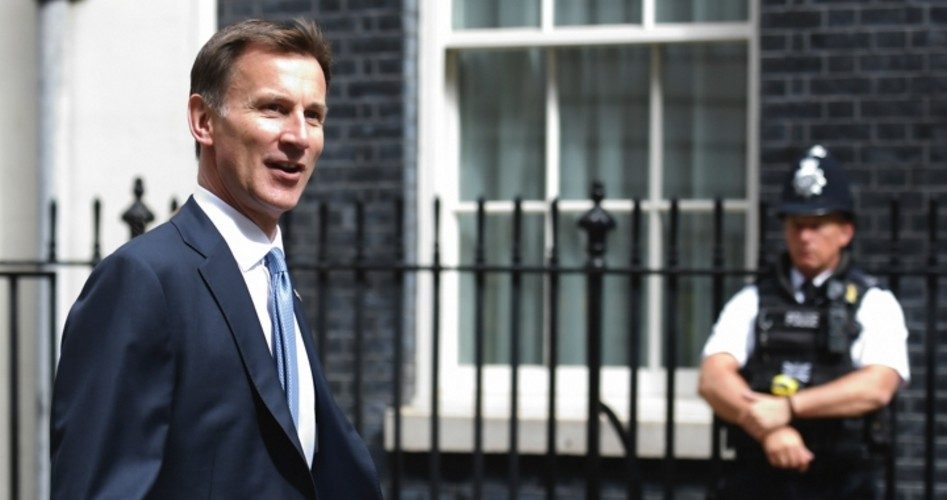
British Foreign Secretary Jeremy Hunt, who has resigned effective today, told Parliament on July 22 that the U.K. plans to develop and deploy a Europe-led “maritime protection mission” to safeguard shipping in the strategically important Strait of Hormuz, through which about a fifth of the world’s oil passes.
“It is with a heavy heart that we are announcing this increased international presence in the Gulf, because the focus of our diplomacy has been on de-escalating tensions in the hope that such changes would not be necessary,” Hunt said.
Hunt described Iran’s seizure of a British-flagged tanker in the Strait of Hormuz on July 19 as “an act of state piracy” that must be met with a coordinated international response.
“Under international law, Iran had no right to obstruct the ship’s passage — let alone board her. It was therefore an act of state piracy,” Hunt told parliament.
“We will now seek to put together a European-led maritime protection mission to support safe passage of both crew and cargo in this vital region,” Hunt was quoted as saying by Reuters.
On July 19, Iran’s Revolutionary Guard launched a gunboat and helicopter raid on the U.K.-registered Stena Impero. The Iranians claimed the tanker had turned off its tracker and ignored warnings.
A frigate, the HMS Montrose, was dispatched while the Stena Impero was in Omani waters, but arrived too late to help — after the tanker had entered the Strait of Hormuz.
Another British oil tanker, the Mesdar, was also intercepted by the Iranians and forced toward Iranian territory in what appeared to be a coordinated attack.
However, the Montrose was successful in preventing the interception of another British ship, British Heritage, by positioning herself between that ship and the approaching Iranian vessels.
Ces — had established that the ship entered British waters (the U.K. claims a small area of the strait as part of its territorial waters) and was bound for a refinery in Syria in violation of EU sanctions.
U.S. Secretary of State Mike Pompeo, speaking on Fox News on July 22, called on the U.K. to “take care of their ships” in the Strait of Hormuz.
Pompeo —who is usually a hawkish interventionist — appears to have got things right regarding whose responsibility it is to protect ships that are not our own.
Back in April, Senator Rand Paul (R-Ky.) informed Pompeo that he was not disputing Pompeo’s contention that there is a connection between the Islamic Republic of Iran and the al-Qaeda terrorists, explaining, “My argument is that you do not have the permission of Congress to go to war in Iran. If you want a war in Iran you have to come to us [Congress]. It’s the way the Constitution was written…. This is our history.”
In a much-quoted speech back in 1821, John Quincy Adams said that America “is the well-wisher to the freedom and independence of all. She is the champion and vindicator only of her own.”
Photo: AP Images
Warren Mass has served The New American since its launch in 1985 in several capacities, including marketing, editing, and writing. Since retiring from the staff several years ago, he has been a regular contributor to the magazine. Warren writes from Texas and can be reached at [email protected].
Related articles:
Britain and Iran Confront Each Other in Persian Gulf
Russia Calls U.S. Move to Send More Troops to Middle East “Provocative”
Are Attacks on Oil Tankers at Hormuz Strait a Prelude to War?
Japanese Owner of Tanker Contradicts Claims That Mines or Torpedoes Damaged His Ship
Amid Threat of Physical War, Iran and Trump Engage in War of Words
Administration Hawks Led by John Bolton Create Anti-Iran Military Plan
Iranian Military Leader Says U.S. Deployment of Carrier Group Makes It “a Target”
President Trump Beats War Drums for Iran
Are All the World’s Problems Ours?
Mike Pompeo vs. Rand Paul on the President’s Presumed War Powers



